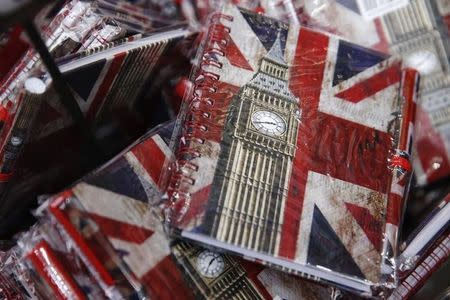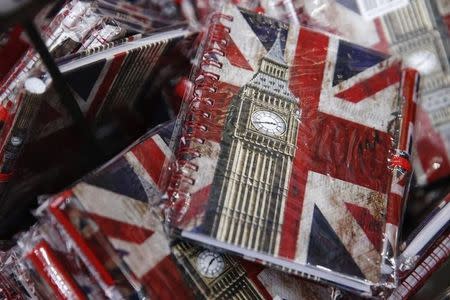Scarred by election flop, British pollsters diverge over Brexit
By Estelle Shirbon
LONDON (Reuters) - If you believe online polls, Britain's looming referendum on whether to quit the European Union will be a tight race that the "out" camp could win. But if you trust telephone polls, the "in" camp should triumph by a wide margin.
The divergence has raised fresh questions about whether polling is reliable after the industry suffered a severe blow to its reputation last year when a general election resulted in a Conservative victory that it totally failed to predict.
The stakes in the referendum could hardly be higher. The EU risks losing its second-biggest economy and one of its two main military powers, while the consequences for Britain in terms of trade, growth and influence in the world could be profound.
The pollsters are desperate to get it right this time.
"I don't think the polling industry can afford to get this one wrong and I think the world will be looking at our performance," said Martin Boon, director of pollster ICM.
The trouble is that pollsters disagree on which method - phone or internet - is producing better results, and independent experts say it is impossible to know for sure.
"The honest truth is there's an awful lot of uncertainty surrounding this referendum," said academic John Curtice, Britain's foremost expert on electoral behaviour.
"If the online polls are correct it's quite close, and we don't know which set of polls is correct, if either."
Over the past six months, the two firms that have been conducting phone polls, ComRes and Ipsos MORI, have consistently found the option to stay in the EU was ahead by well over 10 percentage points, and in some polls by more than 20 points.
But online polls, which are being done more frequently by YouGov, ICM and four other firms, have found that the two sides are neck and neck. The largest lead in an online poll was nine points for the out camp, in a YouGov poll published on Feb. 4.
Curtice has been overseeing a "poll of polls", a rolling average of the six most recent phone and web polls, which provides a summary of the overall referendum polling picture. http://bit.ly/1O4xUc3
Last updated on Feb. 7 when it showed 51 percent in favour of remaining and 49 percent wishing to withdraw, the poll of polls has never shown a lead for the so-called "Brexit" option.
ENGAGEMENT GAP?
Pollsters pointed out that these were early days, with major uncertainties hanging over key aspects of the referendum.
Those include when it will take place, whether some high-profile politicians like London Mayor Boris Johnson will campaign to leave, and what final deal on Britain's membership terms Prime Minister David Cameron will secure from Brussels.
Pollsters from both sides of the divide also said they expected there would be some convergence between the two methods as campaigning intensified and voters became more engaged.
For now, a phone versus online debate is in full swing.
One argument put forward in favour of phone polls is that web panels tend to attract more politically engaged respondents, as people must voluntarily participate rather than receiving uninvited calls. This could skew online results towards the out camp, regarded as the more committed group.
Tom Mludzinski, director of political polling at ComRes, said it was also difficult for internet polls to reach elderly voters. He saw a risk that those older people who did take part in online surveys were not typical of their age group and potentially more passionate about wanting Brexit.
"Our experimentation has led us to view telephone to be the most reliable for this particular issue," Mludzinski said, adding that for certain other contests online polls were better.
But others countered that respondents to phone polls may not be representative of the broader population either, because most people hang up and only a small minority take part.
Boon said that in one phone poll conducted by ICM before last year's election, it took 28,000 calls to get 2,000 interviews. He said low response rates were common nowadays.
Several pollsters noted that in the run-up to the election, online polls over-estimated support for anti-EU party UKIP while phone polls under-estimated it, which some said reflected how web surveys attracted the more politically engaged.
If there is a correlation between the UKIP vote and support for Brexit, as seems likely at least to some extent, then that could suggest a similar effect in the EU referendum polling.
Boon said this was possible but speculative as he had found no evidence of UKIP voters being over-represented in ICM's online referendum polls.
"My personal inclination is that the telephone polls are probably a bit too far one way and the online polls are a bit too far the other way, which magnifies the separation between the two," he said.
'AN INTRIGUING MYSTERY'
Anthony Wells, director of political and social research at YouGov, said a further source of uncertainty was the fact that online polls were getting a much higher proportion of "don't know" responses than phone polls.
"If the difference between the two is how knowledgeable people are and how strongly people feel and how engaged they are in politics, then the 'don't knows' should be the other way round," he said, adding that this was "an intriguing mystery".
One risk is that people could be telling phone interviewers they favour staying in the EU because they don't want to seem uninformed and they perceive that stance to be uncontroversial, a psychological factor that would not affect online polls.
"If it is causing more people who don't have an opinion to say that they would vote to stay in the EU then the leads for 'remain' in the phone polls are phantom," Adam Drummond, who manages political polling at Opinium, said in a blog.
Further complicating the picture is the fact that most pollsters changed their surveying techniques after last year's election fiasco, and may tweak them further when an independent inquiry into what went wrong makes recommendations next month.
That raises the prospect that the poll figures could change in coming weeks and months, reflecting different methods rather than an underlying shift in public opinion.
Boon said that ICM was in the process of applying technical innovations that would have a material effect on referendum voting intentions in its future polls, though he declined to say which of the in or out camps would benefit.
Taking all the arguments and counter-arguments into account, these are nervous times for pollsters, as expressed by Boon when asked to pin down the reason for the phone-online divide.
"If I knew that I'd be sitting very much more comfortably than I do sit."
(Editing by Guy Faulconbridge and Pravin Char)





